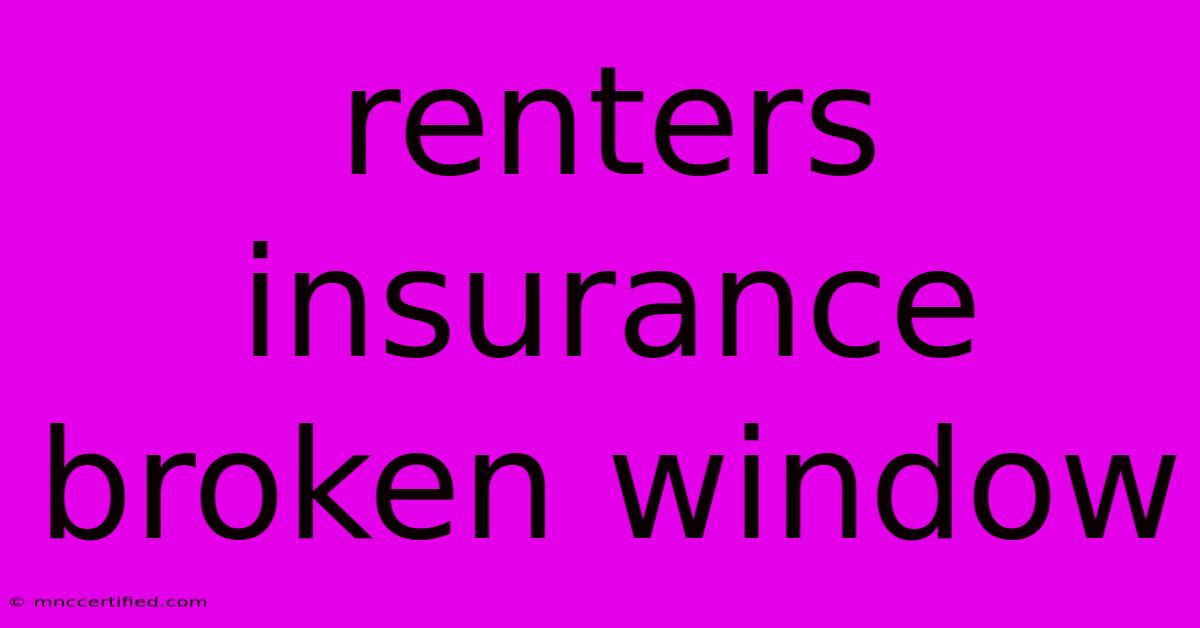Renters Insurance Broken Window

Table of Contents
Renters Insurance and Broken Windows: What You Need to Know
Finding yourself with a broken window is never fun, but knowing your renters insurance policy can alleviate some stress. This article will guide you through understanding renters insurance coverage for broken windows, what to do in case of a break-in, and how to file a claim effectively.
Understanding Renters Insurance Coverage
Renters insurance, unlike homeowners insurance, protects your personal belongings and covers your liability if someone gets injured on your property. A crucial aspect of this coverage often includes damage to your property caused by certain events, including broken windows. However, the specifics depend heavily on your individual policy and the cause of the breakage.
What's Typically Covered?
Most renters insurance policies cover broken windows resulting from:
- Accidents: Accidentally breaking a window while playing catch or a sudden storm causing damage is usually covered.
- Vandalism: If a window is broken due to vandalism or malicious damage, your policy will likely cover the repair or replacement.
- Theft: A broken window resulting from a burglary or attempted burglary will usually be covered under your policy.
What Might Not Be Covered?
Some situations might not be covered by your renters insurance, including:
- Neglect: If the window broke due to long-term neglect or a lack of maintenance, your claim might be denied.
- Normal Wear and Tear: A window that breaks due to age or general wear and tear is typically not covered.
- Acts of God (depending on your policy): While many policies cover storm damage, some specific acts of God may have limitations or exclusions. Always review your policy details.
What to Do if You Have a Broken Window
The steps you take immediately after a broken window incident are crucial for a smooth insurance claim process.
- Ensure Safety: Prioritize your safety and the safety of others. If the broken glass poses a significant hazard, board up the window to prevent further damage or injury.
- Document the Damage: Take clear photos and videos of the broken window from multiple angles. Include shots of the surrounding area to show the extent of the damage.
- Contact Your Landlord (if applicable): Inform your landlord about the broken window, especially if it's a shared window or involves structural damage beyond your personal belongings.
- Report to the Police (if necessary): If the broken window resulted from a crime like vandalism or burglary, report it to the police immediately and obtain a police report number. This is essential documentation for your insurance claim.
- Contact Your Insurance Company: Call your insurance company to report the incident. They will guide you through the claims process and may require additional information or documentation.
Filing a Renters Insurance Claim
Filing a claim efficiently is key to a successful outcome. Be prepared to provide:
- Your policy information: Have your policy number readily available.
- Details of the incident: Clearly explain how the window broke, including the date and time.
- Photos and videos of the damage: Provide the visual documentation you gathered.
- Police report (if applicable): If a crime was involved, provide a copy of the police report.
- Repair or replacement estimates: Obtain quotes from reputable window repair or replacement companies.
Choosing the Right Renters Insurance
When selecting a renters insurance policy, carefully review the coverage details, paying close attention to what is and isn't covered regarding property damage. Don't hesitate to ask your insurance provider clarifying questions about specific scenarios, like broken windows. Comparing quotes from different providers can help you find the best coverage at a competitive price.
Keywords: Renters insurance, broken window, window repair, renters insurance claim, vandalism, burglary, property damage, insurance coverage, home insurance, claim process, police report
This comprehensive article addresses the user query effectively, incorporating relevant keywords naturally within the text. The use of headers, bold text, and a clear structure enhances readability and SEO. Remember to always consult your specific insurance policy for the most accurate information.

Thank you for visiting our website wich cover about Renters Insurance Broken Window. We hope the information provided has been useful to you. Feel free to contact us if you have any questions or need further assistance. See you next time and dont miss to bookmark.
Featured Posts
-
Spurs Beat Man City 4 0 Premier League Match
Nov 24, 2024
-
Iu Footballs Ohio State Loss Grade Breakdown
Nov 24, 2024
-
U Mass Vs Georgia Live Ncaa Football
Nov 24, 2024
-
American Heritage Gap Insurance
Nov 24, 2024
-
U Mass Vs Georgia Score Live Game Updates
Nov 24, 2024